MPs vote AGAINST clause to guarantee negotiations on keeping Erasmus+
A vote in the House of Commons has cast doubt on the future of Erasmus+ in the UK. Here's what we know so far...

Credit: donfiore (background) – Shutterstock
For students and grads across the country, Erasmus+ has been a massive part of their uni experience. It had been thought that the government might push to keep full membership of the programme despite Brexit, but a vote in the House of Commons has led some to question if this will be the case.
With a majority of 344 to 254, MPs have voted against a second reading of New Clause 10 – this clause would have required them to continue negotiations to try to keep full membership of the Erasmus+ programme.
As part of Erasmus+, students in the UK have been able to study abroad as part of their degree. But, as it's a European Union programme, Brexit could affect whether UK students will continue to have access to it after the transition period (end of 2020).
Read on for more info about what this could mean for the future of Erasmus+ in the UK, and to see the response to the news so far.
Is this the end of Erasmus+ in the UK?
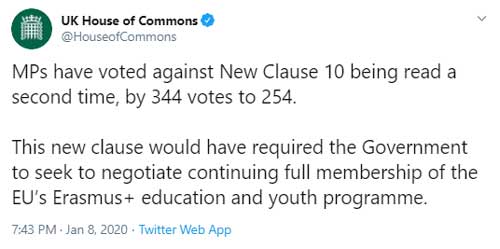
Credit: UK House of Commons – Twitter
On 8th January, the UK House of Commons tweeted the news that MPs had voted against New Clause 10, which would have required the government to negotiate with the EU to keep our full membership of Erasmus+.
MPs have been voting since Tuesday 7th January on the Withdrawal Agreement Bill to decide on the arrangements for the UK to leave the EU.
Voting against a second reading of New Clause 10 means that Erasmus+ will no longer be a mandatory part of Brexit talks between the UK and the EU. Given some of the huge opportunities that students can have through the Erasmus+ programme, this decision is surprising, to say the least.
Response on Twitter
After the House of Commons shared the news, many people rushed to tweet their disappointment – at the time of writing, 'Erasmus' is trending on Twitter in the UK.
South West MEP, Molly Scott Cato, quoted the tweet from the House of Commons, describing it as "a tragedy for our young people".
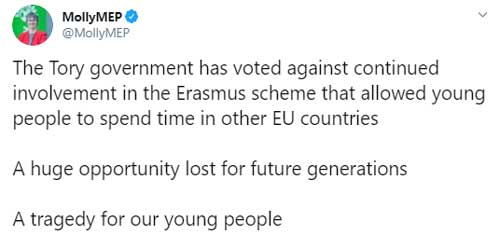
Credit: MollyMEP – Twitter
Similarly, Paul Bernal, an Associate Professor in Law at UEA, described the vote as "diabolically stupid, short-sighted and counterproductive".
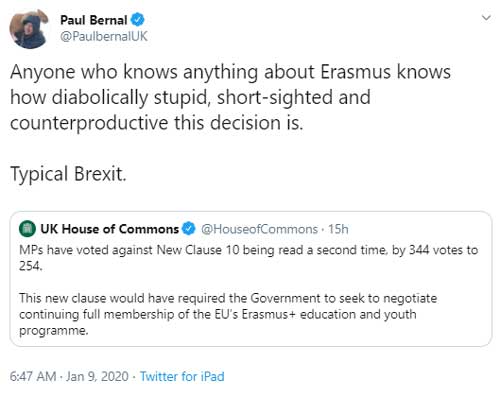
Credit: Paul Bernal – Twitter
But, the decision on whether to continue participating in Erasmus+ may not be as final as it first seems...
Confusion over the Erasmus+ news

Credit: fizkes – Shutterstock
While the news is undoubtedly disappointing, we think it's important to stress that it does not necessarily mean that Erasmus+ won't continue.
A lot of people on Twitter have assumed that MPs have made a final decision to withdraw from Erasmus+, which isn't quite the case.
The vote against a second reading of New Clause 10 means that the government does not have to seek to negotiate keeping full membership of Erasmus+ but, if they wish, they could still do so.
Admittedly, however, it does suggest that the majority of MPs don't see Erasmus+ as a priority, so the chances of it continuing after the Brexit transition process are looking much less likely.
Jon Henley, The Guardian's Europe correspondent, responded to some of the confusion over the House of Commons' tweet.
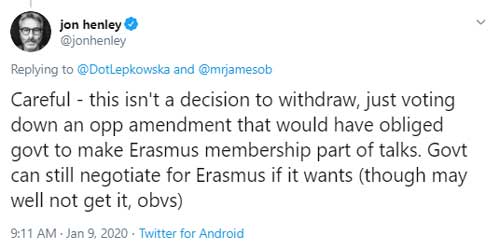
Credit: jon henley – Twitter
And, it's worth noting that this was not the only clause voted against by MPs.
For example, on 8th January, MPs also voted down Amendment 4 to Clause 37 – this would have ensured unaccompanied child refugees would have the right to be reunited with their family after Brexit. The amendment was defeated by a few votes more than the Erasmus+ clause, at 348 votes to 252.
While we've seen arguments that this shows the government wants the freedom to negotiate without restrictive amendments and clauses, others are concerned that the majority of MPs are simply not pushing for important issues to be included in the Withdrawal Agreement Bill.
Update: the government's response
Following the outrage on Twitter, Universities Minister, Chris Skidmore, described yesterday's vote as "game playing by opposition parties" in a tweet.
Referring to the UK's participation in Erasmus+, he claimed, "this will be part of future negotiations with the EU". Let's hope this is the case.
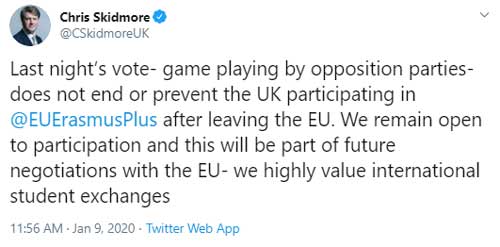
Credit: Chris Skidmore – Twitter
If you're studying in the UK as an EU student, check out our guide to understanding your tuition fees.








